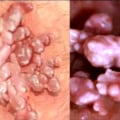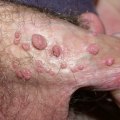It is common for it to take a few weeks or several months from the time of infection until visible lesions appear. However, it is possible to be infected and never have visible genital warts. In rare cases, warts can even appear years after infection. The virus that causes genital warts is known as human papillomavirus (HPV).
HPV is the most common sexually transmitted infection (STI) and there are more than 180 types of HPV. Some of these types cause warts on other parts of the body, but types 6 and 11 are most commonly associated with genital warts. If a person has been infected with HPV, it can take one to three months (or longer in some cases) for warts to appear. It is possible for a person to be infected with HPV and never develop warts.
If a person does develop warts, they can appear on the penis or around the rectum in men, and around the opening of the vagina, in the cervix (opening of the womb), or around the rectum in women. Warts can grow quickly, especially when there is a lot of sweating or moisture present. They may also grow faster during pregnancy. It is important to note that while some types of HPV can cause cervical and anal cancers, these are not the same viral types that cause genital warts.
The two strains covered by the Gardasil vaccine, HPV-6 and HPV-11, account for approximately 90% of genital warts. This vaccine is 90% effective in protecting against cervical, vaginal and vulvar cancers in women and anal cancer in men, as well as in protecting against genital warts. If you care for babies or children with HPV, it is important to read Helping HH-I-398, Genital Warts in Infants and Children. Treatment can get rid of genital warts and help reduce future outbreaks, although it may take several months to be effective.
Genital warts can also develop in the mouth or throat of a person who has had oral sex with an infected person. To reduce the risk of HPV being transmitted to others, people with a wart outbreak should abstain from sex until the warts have been absent for two weeks. Genital warts usually rise above the surface of the skin, present parakeratosis and present nuclear changes typical of HPV infections (nuclear enlargement with perinuclear elimination). The best way to prevent HPV infection and genital warts is to abstain from having sex or limit sexual contact to an uninfected person.
In addition to getting rid of genital warts more quickly, treatment can also alleviate associated pain, itching, and irritation. Doctors may prescribe a cream containing green tea extract to treat external genital and anal warts. DNA testing should not be used for diagnosis or for low-risk HPV infections.










